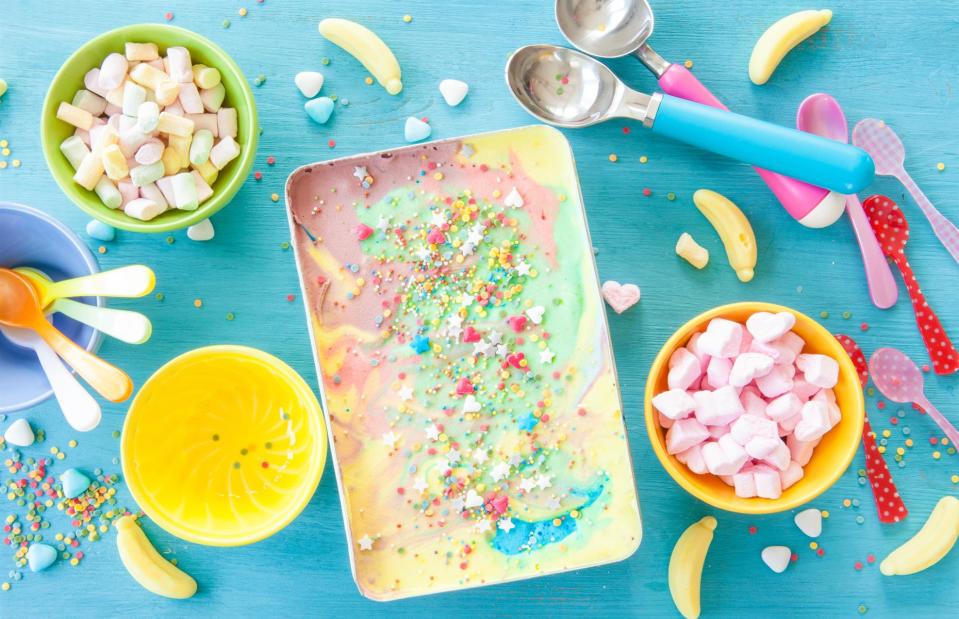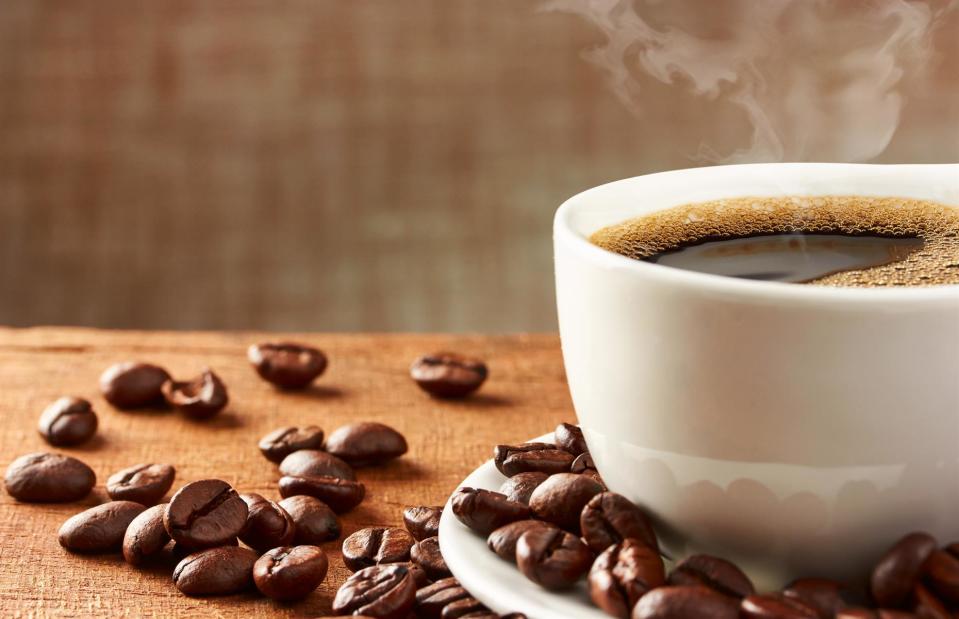21 healthy eating tips that are actually BAD for you
Busting the myths

forstbreath/Shutterstock
There's all sorts of advice out there aimed at trying to get us to eat more healthily and stay in shape. But some of the healthy eating opinions presented as fact are actually misleading, outdated or just plain wrong. Here are 21 healthy eating myths to put to rest – the sooner you do so, the better for your health, weight and wellbeing.
There's a right way to eat

beats1/Shutterstock
There isn’t really one diet that’s healthiest for everyone – as illustrated by recent evidence that showed different people have totally personal blood sugar and insulin responses to common foods such as bananas, muffins and bread. That said, a common characteristic from the world’s blue zones – areas with long-lived populations – is that people eat a largely plant-based diet.
Five a day is based on hard science

Africa Studio/Shutterstock
If this were the case, guidelines would be the same everywhere, but they’re not – Australia says seven a day and America nine (though the Brit recommendation doesn’t include potatoes, while the Australian and US ones do). 14% of gastrointestinal cancer and 11% of heart disease deaths are linked to too little fruit and veg, says the World Health Organization (WHO), so we should just be eating more, full stop. However, the WHO recommends at least 400g (14.1oz) non-starchy fruit and veg daily, which is, in fact, five 80g (2.8oz) portions.
Chocolate gives you spots

Africa Studio/Shutterstock
Acne is mostly caused by the production of hormones and the effect these have on the sebaceous (oil) glands in the skin, not by diet. A generally poor diet with lots of refined carbohydrate foods that tend to spike blood sugar may contribute to acne by elevating hormones that trigger acne. But there is no evidence linking chocolate specifically with spots.
Don’t chew gum in case you accidentally swallow it

Studio KIWI/Shutterstock
Chewing xylitol gum is good for your teeth and there's no need to worry about swallowing it by accident (though you shouldn't do it on purpose). Swallowed gum isn’t digested, but simply passes through your digestive tract the same pace as any other food.
Spinach is a top source of iron

Sunny Forest/Shutterstock
When scientists first analysed the nutritional value of spinach, they made mistakes in the analysis and overestimated the iron it contained. It’s still a decent source – there’s 10% of the recommended daily amount in a 90g (3.1oz) serving of boiled spinach, but that compares with 16% in a 90g (3.1oz) serving of roast beef topside (and the iron is far less well absorbed from plants than animal sources). Nevertheless, eating spinach and other greens daily still helps top up your iron levels.
Only water hydrates you properly

Alter-ego/Shutterstock
The water in tea, coffee, soft drinks, and juices all counts as fluid to keep you hydrated, as does the fluid provided by high water foods such as fruit and vegetables. And research shows regular coffee drinkers don’t need to worry about caffeine being a diuretic either – it did not affect hydration in a controlled study.
Sugar makes kids hyperactive

Barbara Neveu/Shutterstock
Parents, we know... it’s hard to believe this one isn’t true given the proof of children bouncing off the walls at parties. However, the idea that sugar causes hyperactivity was actually disproven long ago. Researchers say the sugar high expectation is about cognitive bias – in a separate research where mothers were told their kids had been given a large dose of sugar rated them as significantly more hyperactive, even though the kids had actually only been given placebo.
Sugar is the main cause of Type 2 diabetes

Fascinadora/Shutterstock
Diabetes UK says that high sugar foods contribute excess calories, and it is this rather than sugar directly that can create the fatty pancreas that leads to people getting Type 2 diabetes. However, sugary drinks seem to be linked with diabetes unrelated to their effect on body weight. It’s a good idea to limit your sugar intake for many other health-related reasons.
Vitamin C will prevent a cold

Supitcha McAdam/Shutterstock
Vitamin C supplementation doesn’t reduce the incidence of colds for most people, according to a comprehensive review. However, it might help some people, such as marathon runners, undertaking extreme physical exercise, which causes a dip in immune function.
Cookies may contain plasticisers to keep them soft

Anastasia_Panait/Shutterstock
American-style soft cookies are soft because of a high fat and moisture content. Sugar helps by holding the moisture in and slight under-baking means it doesn’t all evaporate. Some cookies may contain compounds such as glycerine, sorbitol, or monoglycerides to retain more moisture, but these are all permitted food additives. Non-food additives such as plasticisers, used to soften plastic, are not allowed.
Mixing your drinks results in a worse hangover

Olexander Kozak/Shutterstock
Grape or grain, but never the twain goes the saying, but there's actually no evidence that mixing your drinks makes for a worse hangover. It’s more likely just the total amount of alcohol that’s the problem and if you follow three glasses of wine with three of whisky it is asking for trouble.
MSG is an unhealthy food additive

DronG/Shutterstock
While MSG (monosodium glutamate) shouldn't be needed in well-cooked tasty dishes, there’s no evidence that it causes the so-called Chinese restaurant syndrome – more likely, you just ate too much. An aversion to MSG is essentially a form of food snobbery as it’s actually the same chemical as the umami present in posh foods like Parmesan, porcini mushrooms and bonito flakes.
There are no plant sources of vitamin D

New Africa/Shutterstock
Mushrooms can actually contain quite good amounts of vitamin D, but only if they've been exposed to sunshine. Some already come UV-treated (in which case it will mention they are vitamin D–enriched on the label). Otherwise, you can put them gill-side up by a sunny window for an hour before eating.
Plant-based milk alternatives are healthier

Madeleine Steinbach/Shutterstock
Some plant-based milk alternatives, like oat, may be more environmentally friendly, but they aren’t healthier than dairy. Most have a fraction of the protein of dairy milk (soy is an exception) and little or no calcium and vitamin B12 – both found in high quantities in cows’ milk. If you are using a plant alternative to milk, always check if these nutrients are added.
Canned food is less nutritious

Africa Studio/Shutterstock
The canning process can reduce some heat sensitive nutrients such as vitamin C and folate, but once in the can, the levels stay stable until you open it. A 2015 study in the journal Nutrients found that people who consumed more than six canned food items a week had higher intakes of 17 essential nutrients including potassium, calcium and fibre than those who ate less than two cans a week.
Frozen fruit and vegetables aren’t as good for you

Alina ptashka/Shutterstock
Frozen fruit and vegetables can suffer a small initial fall in nutrients during the blanching process, which is used prior to freezing to kill the enzymes that could cause deterioration. But as they are processed within hours after picking, while at their nutritional peak, they still compare very favourably to fresh versions.
Oranges are the best source of vitamin C

Kazyavka/Shutterstock
Red, yellow and green peppers all have more than twice as much vitamin C as oranges, with all of the recommended daily intake (80mg) per half a pepper. Brussels sprouts, kale, blackcurrants and strawberries are also all richer sources.
White bread is bad for you

forstbreath/Shutterstock
Not necessarily – in fact white bread has more calcium than wholemeal bread, with an average of 71mg per slice versus 42mg in wholemeal. That’s because white bread flour is fortified with this mineral for healthy bones, but wholemeal bread flour isn’t. And while white bread has 65% less fibre than wholemeal, it is still a relatively good source with roughly the same amount as a small apple.
Eat little and often to boost your metabolism

Tatiana Bralnina/Shutterstock
One study found that slimmers who ate the same amount of calories in just two meals actually lost more weight than people who spilt the same calories over six meals. One reason not to graze? It can be too easy to lose track of what you’re eating.
A low-fat diet is bad for you

Sea Wave/Shutterstock
The low-fat diet took a big fall from grace once it was realised that processed foods marketed as low fat were often higher in sugar. But going low fat isn’t in itself bad – a 2019 follow up of the Women’s Health Initiative Dietary Modification Trial, which started in 1993, actually found fewer cases of breast cancer deaths and insulin-requiring Type 2 diabetes in those on a low fat diet with the carbs coming from fruit, vegetables and grains, including whole grains.
Coffee is bad for you

Portumen/Shutterstock
While on the subject of coffee, it’s not true that it's a carcinogen as once thought. In fact, if anything, phytochemicals in coffee may help reduce the risk of cancer – particularly endometrial and liver cancer – according to the American Institute of Cancer Research. This is thought to be the case for both standard and decaffeinated coffee.
Now take a look at 20 'healthy' foods that nutritionists say to steer clear of


